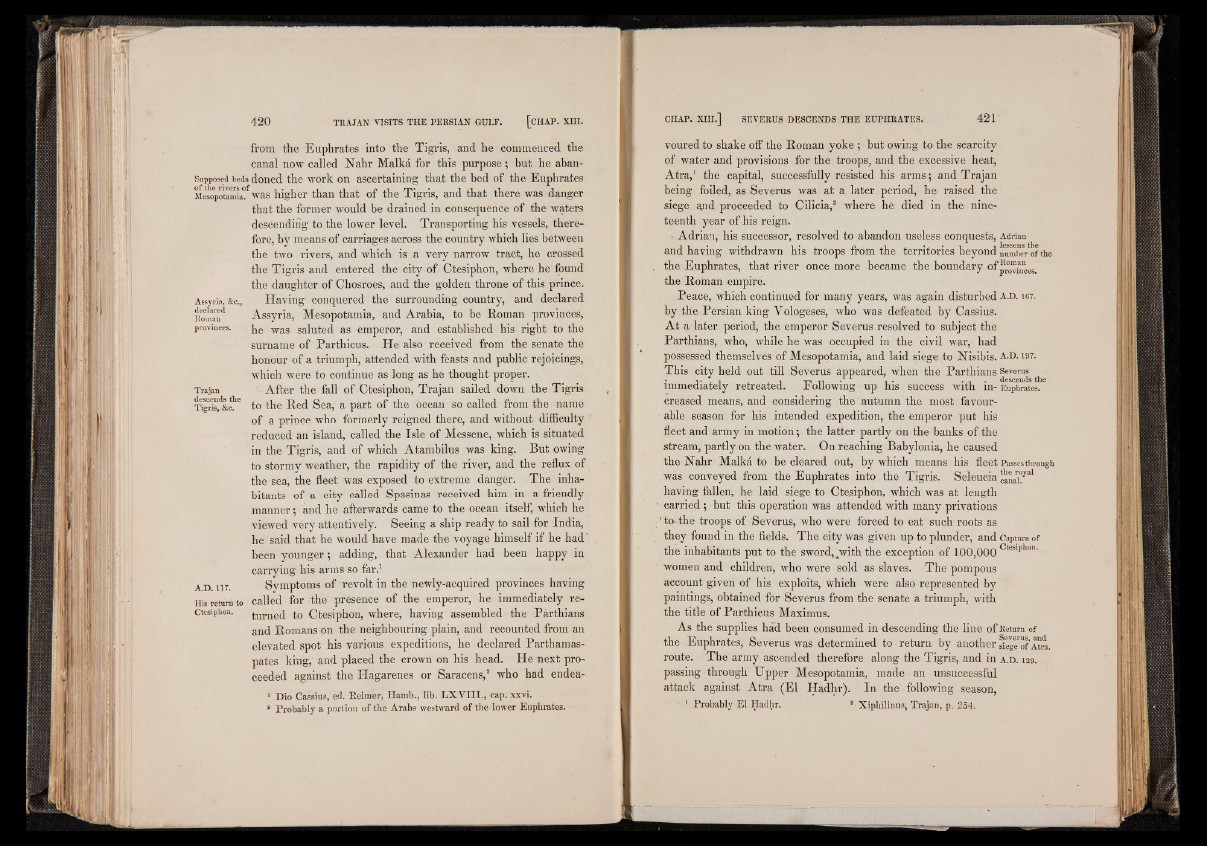
from the Euphrates into the Tigris, and he commenced the
canal now called JSTahr Malka for this purpose; but he aban-
Supposed beds doned the work on ascertaining that the bed of the Euphrates
Mesopotamia^ was higher than that of the Tigris, and that there was danger
that the former would be drained in consequence of the waters
descending to the lower level. Transporting his vessels, therefore,
by means of carriages across the country which lies between
the two rivers, and which is a very narrow tract, he crossed
the Tigris and entered the city of Ctesiphon, where he found
the daughter of Chosroes, and the golden throne of this prince.
Assyria, &c., Having conquered the surrounding country, and declared
iiomand Assyria, Mesopotamia, and Arabia, to be Roman provinces,
provinces. }ie was saluted as emperor, and established his right to the
surname of Parthicus. He also received from the senate the
honour of a triumph, attended with feasts and public rejoicings,
which were to continue as long as he thought proper.
Trajan After the fall of Ctesiphon, Trajan sailed down the Tigris
Tig.isf&c.6 to the Red Sea, a part of the ocean so called from the name
of a prince who formerly reigned there, and without difficulty
reduced an island, called the Isle of Messene, which is situated
in the Tigris, and of which Atambilus _ was king. But owing
to stormy weather, the rapidity of the river, and the reflux of
the sea, the fleet was exposed to extreme danger. The inhabitants
of a city called Spasinas received him in a friendly
manner: and he afterwards came to the ocean itself, which he
viewed very attentively. Seeing a ship ready to sail for India,
he said that he would have made the voyage himself if he had
been younger; adding, that Alexander had been happy in
carrying his arms so far.1
a .d . in. Svmptoms of revolt in the newly-acquired provinces having
His return to called for the presence of the emperor, he immediately re-
Ctesiphon. turned to Ctesiphon, where, having assembled the Parthians
and Romans on the neighbouring plain, and recounted from an
elevated spot his various expeditions, he declared Parthamas-
pates king, and placed the crown on his head. He next proceeded
against the Hagarenes or Saracens,2 who had endea-
1 Dio Cassius, ed. Beimer, Hamb., lib. L X V I I I ., cap. xxvi.
‘ Probably a portion of the Arabs westward of the lower Euphrates.
voured to shake off the Roman yoke ; but owing to the scarcity
of water and provisions for the troops, and the excessive heat,
Atra,1 the capital, successfully resisted his arms; and Trajan
being foiled, as Severus was at a later period, he raised the
siege ajid proceeded to Cilicia,2 where he died in the nineteenth
year of his reign.
- Adrian, his successor, resolved to abandon useless conquests, Adrian
and having withdrawn his troops from the territories beyond uumber of the
the Euphrates, that river once more became the boundary ofpr°“?,“es<
the Roman empire.
Peace, which continued for many years, was again disturbed a .d . 167.
by the Persian king Yologeses, who was defeated by Cassius.
At a later period, the emperor Severus resolved to subject the
Parthians, who, while he was occupied in the civil war, had
possessed themselves of Mesopotamia, and laid siege to ISTisibis. a .d . 197.
This city held out till Severus appeared, when the Parthians Severus
immediately retreated. Following up his success with in-Euphrates,
creased means, and considering the autumn the most favourable
season for his intended expedition, the emperor put his
fleet and army in motion; the latter partly on the banks of the
stream, partly on the water. On reaching Babylonia, he caused
the Nahr Malka to be cleared out, by which means his fleet Passesthrough
was conveyed from the Euphrates into the Tigris. Seleucia
having fallen, he laid siege to Ctesiphon, which was at length
carried ; but this operation was attended with many privations
' to- the troops of Severus, who were forced to eat such roots as
they found in the fields. The city was given up to plunder, and Capture of
the inhabitants put to the sword,^with the exception of 100,000 Ctcsiphon‘
women and children, who were sold as slaves. The pompous
account given of his exploits, which were also represented by
paintings, obtained for Severus from the senate a triumph, with
the title of Parthicus Maximus.
As the supplies had been consumed in descending the line of Return of
the Euphrates, Severus was determined to return by another lege of Atra.
route. The army ascended therefore along the Tigris, and in a .d . 129.
passing through Upper Mesopotamia, made ■ an unsuccessful
attack against, Atra (El Hadhr). In the following season,
~ 1 Probably El Hadhr. ! Xiphilinus, Trajan, p. 254.